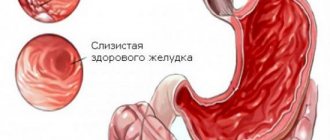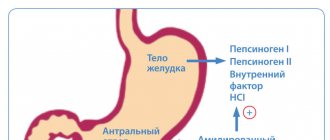Vomiting is a reflex eruption of the contents of the stomach and sometimes the duodenum through the mouth.
The gag reflex is quite complex - it involves various muscle groups. It is controlled by the vomiting center located in the brain stem. By its nature, vomiting is a mechanism by which the body protects itself from poisoning. Normally, vomiting is a reaction to toxic substances entering the gastrointestinal tract or simply something that cannot be digested - for example, too fatty foods. Therefore, after an attack of vomiting, a person often feels relief: the body has been cleansed.
However, the intoxication that caused vomiting may have an internal source, that is, be a consequence of some pathology or disease. It is also possible that the irritation of the nervous system leading to vomiting is not related to the condition of the stomach at all. This makes us perceive vomiting as a very serious, and even ominous, symptom. An attack of vomiting is almost always a sufficient reason to consult a doctor. In case of repeated attacks, you should definitely consult a doctor!
Causes of vomiting
In most cases, vomiting is caused by irritation of the stomach receptors or, in medical terms, has a visceral
origin. The cause is most often acute or chronic diseases of the stomach itself (acute food poisoning, gastritis, stomach ulcers, food allergies). Also, stomach receptors can react to diseases of other organs - the gallbladder, uterus, heart (vomiting is part of the complex of possible symptoms of myocardial infarction).
Vomiting may also be central
origin, that is, caused by pathologies of the central nervous system (brain), such as meningitis, encephalitis, trauma and brain tumors. Vomiting is quite common during migraines. Inner ear problems can also lead to vomiting (in this case, vomiting may occur along with dizziness). If the receptors of the inner ear are excessively irritated (with motion sickness), even a healthy person can vomit, especially if the vestibular apparatus is not trained. Sometimes vomiting is caused by emotional distress (stress) or is a reaction to something that causes extreme disgust (conditioned vomiting).
Irritation of the vomiting center can be caused by toxic substances carried by the bloodstream ( hematogenous-toxic
vomit). Toxic substances can enter the body from the outside (for example, chlorine or carbon monoxide through inhalation), or they can be produced in the body itself as a result of impaired liver or kidney function.
Acute form
The acute form implies the sudden onset of the disease. A person suddenly, without obvious reasons, feels nausea, malaise and vomiting. The acute form sometimes accompanies a person for a week. Unlike the chronic form, the pain does not intensify in the morning, and nausea occurs regardless of the time of day.
As a rule, the acute form is associated with the occurrence of infection, the intake of low-quality products, and potent medications. The listed factors irritate the gastric mucosa, leading to inflammation that requires immediate treatment. Secretory function is disrupted, digestion suffers, and the muscle tone of the digestive organ decreases. In the acute form, a person feels severe weakness, fatigue, and fever. Treatment is inpatient, and FGDS (fibrogastroduodenoscopy) is considered a prerequisite.
Fibrogastroduodenoscopy
Vomiting and other symptoms
Vomiting is usually preceded by nausea, because, in essence, vomiting is the resolution of nausea, its logical conclusion. The fact that nausea turned into vomiting indicates the severity of the pathological process. Vomiting spasms can be observed against a background of elevated temperature, accompanied by diarrhea. In addition to food debris, gastric juice and mucus, vomit may contain bile, blood, and pus.
Repeated, periodically recurring and indomitable vomiting exhausts and dehydrates the body, leading to disruption of mineral metabolism and acid-base balance.
- Diarrhea and vomiting
Vomiting and fever
When vomiting is scary
Any attack of vomiting is a very unpleasant experience. Even if a person experiences relief with the resolution of the attack, the vomiting itself is perceived as an extraordinary event, which should not normally occur. Shock to the body, everyday and social inconveniences - all this makes vomiting a process of a different order compared to other reflex actions, such as coughing or sneezing. We always react sharply to vomiting (we don’t ignore it), and rightly so.
However, in some cases, vomiting worries us especially strongly. This is vomiting bile , vomiting blood . Parents are concerned about cases of vomiting in children . Quite often, vomiting is observed during pregnancy , attracting increased attention.
These cases are worth mentioning separately:
- Vomiting bile
Vomiting blood
Vomiting during pregnancy
Vomiting in a child
Ways to eliminate nausea
Discomfort completely disappears only after a course of treatment for gastritis. It should be prescribed by a gastroenterologist after examination.
Folk recipes
- Peppermint relieves nausea well. The leaves of the plant can be brewed as tea and drunk in small portions. Instead of herbs, they also use pharmaceutical mint tincture, adding 2-3 drops per glass of boiled water;
- If nausea occurs due to gastritis, you should drink raw potato juice in the morning on an empty stomach. Prepare it fresh each time and drink 150-200 ml. This remedy even helps with stomach ulcers - the juice helps tighten erosions and regenerate the mucous layer;
- Ginger root improves digestive processes. 10 grams of grated root is poured into a glass of boiling water, left for 10-15 minutes and filtered. You can add a spoonful of honey to the resulting drink and drink it throughout the day. It is advisable to drink 300-400 ml of ginger tea per day;
- Dill decoction. The seeds of the plant in the amount of a teaspoon are brewed with a glass of boiling water and heated over low heat for 10 minutes. After cooling, filter and drink half a glass 2 times a day;
- Fennel seeds. They are brewed at the rate of 10 grams per glass of boiling water. The resulting drink is drunk in a glass in the morning after waking up;
- Phytocollection. Mix calendula flowers, St. John's wort leaves, and yarrow in equal proportions. Then take 20 grams of the mixture and brew it with half a liter of boiling water. Infuse the mixture for half an hour, filter and drink 100 ml 30 minutes before meals.
We recommend: Symptoms of exacerbation of gastritis
Folk remedies help remove the main symptoms of gastritis, but it is impossible to completely defeat the disease with their help. Therefore, they can only be used as first aid.
Home first aid kit
In the home medicine cabinet, it is advisable for people with diseases of the digestive system to always have tablets that quickly help if attacks of nausea suddenly appear. It is advisable to select them with your doctor, this will help reduce the likelihood of side effects.
Using the drug Omez
Omez capsules are often included in the complex treatment regimen for gastritis. The medicine accelerates the healing of the mucous layer and blocks the activity of Helicobacter pylori. Due to this, nausea decreases, heartburn and pain go away.
Take the drug one capsule in the morning on an empty stomach. The course of treatment is at least 2 weeks.
Application of Cerucal
Exhausting vomiting due to gastritis is stopped with the drug Cerucal. At the same time, the secretion of bile is normalized, so the medicine can be taken for cholecystitis and biliary dyskinesia. Cerucal should be taken when vomiting, 1 tablet half an hour before meals three times a day. Do not exceed the dosage of the drug, as this increases the likelihood of adverse reactions.
What to do if you are vomiting
Since anyone can have an attack of vomiting, it is useful to know how you can prevent vomiting, what to do during and immediately after an attack, and when you should definitely consult a doctor.
Nausea is a precursor to vomiting. If you feel nauseous, try opening a window (increase oxygen flow), drinking some sweetened liquid (this will calm your stomach), or sitting or lying down (physical activity increases nausea and vomiting). You can dissolve a validol tablet. If you get motion sickness on the road, take some lollipops with you and suck them on the way. This will help prevent vomiting.
What to do during an attack of vomiting
During an attack, it is important to prevent vomit from entering the respiratory tract. The patient should never lie on his back while vomiting. Do not leave small children unattended if they may be vomiting. An elderly or weakened person needs to be helped to turn on his side, with his head towards the edge of the bed, and a pelvis placed in front of him.
What to do after a bout of vomiting
After an attack, you should rinse your mouth with cold water. If the patient cannot do this himself, you need to moisten a piece of gauze in a soda solution and wipe his mouth.
Immediately after an attack, you can drink only a few sips of water, and only if there is no blood in the vomit. You can drink properly only after 2 hours, and eat only 6-8 hours after the attack. Food should be dietary and gentle; the best thing is porridge with water, rice, low-fat soup.
With repeated bouts of vomiting, dehydration may occur. Therefore, it is necessary to drink a special solution that restores water-electrolyte and acid-base balance.
When should you see a doctor if you are vomiting?
Vomit
- in many cases, a sign that the body is experiencing serious problems and needs cleansing, and therefore, most likely, treatment. If the disease is accompanied by vomiting, this usually indicates that the disease is quite severe.
If the attack of vomiting was a one-time occurrence and there is reason to believe that it was caused by overeating, motion sickness, alcohol poisoning or stress, there is no direct need to consult a doctor. In all other cases, consultation with a doctor is necessary. Especially if attacks are repeated for two days or more, as well as in the presence of diabetes mellitus or other chronic diseases.
Sometimes vomiting requires emergency treatment. You should call an ambulance if:
- vomiting is accompanied by constant or severe abdominal pain;
- there are repeated bouts of vomiting after a head injury;
- along with vomiting, dehydration, dry mouth, and increased urination are observed;
- with deterioration of mental and functional activity in older people;
- there is blood in the vomit (for example, impurities in the form of “coffee grounds”).
Is it possible to maintain a healthy stomach?
What to do to prevent the development of gastritis? Doctors recommend radical lifestyle changes, which means:
- quitting smoking, drinking alcohol and drinking coffee in large quantities;
- spend more time in the fresh air;
- avoid stressful situations;
- sleep at least 8 hours;
- eat a balanced diet, sometimes go on a healthy diet;
- if the disease is detected but cured in time, you should follow the doctor’s prescription;
- use folk remedies.
Nausea is a classic symptom of gastritis. To get rid of it and the urge to vomit, it is necessary to select an effective drug and effective treatment. Only an experienced gastroenterologist can do this, taking into account the results of a thorough examination and certain tests. For different types of gastritis, different medications are prescribed: for gastritis with a high level of acidity, some drugs, for gastritis with low acidity, others.
The disease is easier to prevent than to treat. A person needs to adjust their lifestyle, eat right, minimize stress, and pay more attention to their own health.








